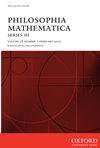论算法、有效程序及其定义
IF 0.6
1区 哲学
Q2 HISTORY & PHILOSOPHY OF SCIENCE
引用次数: 0
摘要
我研究了“算法”作为一个顺序的、循序渐进的、确定性的过程的经典思想(即20世纪30年代已经使用的“算法”思想),涉及三个主题,它与“有效过程”概念的关系,它在逻辑、计算机科学和数学(侧重于数值分析)中的不同作用和用途,以及这些领域从业者提出的不同形式的定义。我认为,“算法”在上述领域已经以不同的方式被概念化和使用,并讨论了采用(经典)“算法”的最终基础理论的挑战和前景。本文章由计算机程序翻译,如有差异,请以英文原文为准。
On Algorithms, Effective Procedures, and Their Definitions
I examine the classical idea of ‘algorithm’ as a sequential, step-by-step, deterministic procedure (i.e., the idea of ‘algorithm’ that was already in use by the 1930s), with respect to three themes, its relation to the notion of an ‘effective procedure’, its different roles and uses in logic, computer science, and mathematics (focused on numerical analysis), and its different formal definitions proposed by practitioners in these areas. I argue that ‘algorithm’ has been conceptualized and used in contrasting ways in the above areas, and discuss challenges and prospects for adopting a final foundational theory of (classical) ‘algorithms’.
求助全文
通过发布文献求助,成功后即可免费获取论文全文。
去求助
来源期刊

Philosophia Mathematica
HISTORY & PHILOSOPHY OF SCIENCE-
CiteScore
1.70
自引率
9.10%
发文量
26
审稿时长
>12 weeks
期刊介绍:
Philosophia Mathematica is the only journal in the world devoted specifically to philosophy of mathematics. The journal publishes peer-reviewed new work in philosophy of mathematics, the application of mathematics, and computing. In addition to main articles, sometimes grouped on a single theme, there are shorter discussion notes, letters, and book reviews. The journal is published online-only, with three issues published per year.
 求助内容:
求助内容: 应助结果提醒方式:
应助结果提醒方式:


